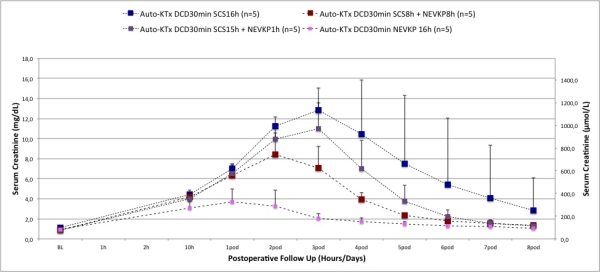Replacing Cold Storage with Normothermic Ex Vivo Kidney Perfusion Improves Function of Grafts Retrieved After Circulatory Death (DCD).
1Department of Surgery, Multi Organ Transplant Program, Toronto General Hospital, University Health Network, Toronto, ON, Canada
2Division of Nephrology, The Hospital for Sick Children, Toronto, ON, Canada
3Laboratory Medicine & Pathobiology, Toronto General Hospital, Toronto, ON, Canada
4Departments of Surgery (Urology) &
Physiology, The Hospital for Sick Children, Toronto, ON, Canada
5Department of Medicine, Multi Organ Transplant Program, Toronto General Hospital, University Health Network, Toronto, ON, Canada.
Meeting: 2016 American Transplant Congress
Abstract number: C108
Keywords: Donors, Graft function, Kidney transplantation, marginal, Preservation
Session Information
Session Name: Poster Session C: Ischemia Reperfusion Injury and Organ Preservation
Session Type: Poster Session
Date: Monday, June 13, 2016
Session Time: 6:00pm-7:00pm
 Presentation Time: 6:00pm-7:00pm
Presentation Time: 6:00pm-7:00pm
Location: Halls C&D
Normothermic ex vivo kidney perfusion (NEVKP) and avoidance of static cold storage (SCS) is an attractive strategy to minimize injury of DCD kidney grafts. We investigated if the duration of NEVKP vs. SCS impacts on post transplant graft function. Methods: After 30 minutes of warm ischemia, right kidneys were removed from 30kg Yorkshire pigs and preserved for 16h with four different combinations of hypothermic and normothermic preservation: A) 16h SCS, B) 15h SCS + 1h NEVKP, C) 8h SCS + 8h NEVKP, D) 16h NEVKP. Following preservation, renal grafts were autotransplanted and pigs were followed up for 8 days. Results: Throughout NEVKP physiologic values of electrolytes and pH values were maintained. Initial high parameters of intrarenal resistance and lactate decreased significantly (p<0.05). Following renal autotransplantation, all pigs survived. Grafts preserved with 16h NEVKP demonstrated significantly lower peak serum creatinine values (3.7±1.3mg/dL) when compared to grafts preserved with 16h SCS (12.9±2.2mg/dL), 15h SCS + 1h NEVKP (11.0±2.6mg/dL), and 8h SCS + 8h NEVKP (7.1±2.1) (p<0.001)  . 24-hour creatinine clearance at day 3 after surgery was significantly increased in the 16h NEVKP (63.4±19.0mL/min) group vs. 16h SCS (4.3±2.1mL/min), 15h SCS + 1h NEVKP (4.6±2.0mL/min), and 8h SCS + 8h NEVKP (13.4±8.1mL/min) (p<0.001). Conclusion: Post transplant kidney function of DCD grafts is better with increasing NEVKP and decreasing SCS times. Immediate start of NEVKP from retrieval until transplantation results in optimal outcome.
. 24-hour creatinine clearance at day 3 after surgery was significantly increased in the 16h NEVKP (63.4±19.0mL/min) group vs. 16h SCS (4.3±2.1mL/min), 15h SCS + 1h NEVKP (4.6±2.0mL/min), and 8h SCS + 8h NEVKP (13.4±8.1mL/min) (p<0.001). Conclusion: Post transplant kidney function of DCD grafts is better with increasing NEVKP and decreasing SCS times. Immediate start of NEVKP from retrieval until transplantation results in optimal outcome.
CITATION INFORMATION: Kaths J, Chun Y.-M, Cen D, Echeverri J, Linares I, Yip P, John R, Bagli D, Mucsi I, Ghanekar A, Grant D, Robinson L, Selzner M. Replacing Cold Storage with Normothermic Ex Vivo Kidney Perfusion Improves Function of Grafts Retrieved After Circulatory Death (DCD). Am J Transplant. 2016;16 (suppl 3).
To cite this abstract in AMA style:
Kaths J, Chun Y-M, Cen D, Echeverri J, Linares I, Yip P, John R, Bagli D, Mucsi I, Ghanekar A, Grant D, Robinson L, Selzner M. Replacing Cold Storage with Normothermic Ex Vivo Kidney Perfusion Improves Function of Grafts Retrieved After Circulatory Death (DCD). [abstract]. Am J Transplant. 2016; 16 (suppl 3). https://atcmeetingabstracts.com/abstract/replacing-cold-storage-with-normothermic-ex-vivo-kidney-perfusion-improves-function-of-grafts-retrieved-after-circulatory-death-dcd/. Accessed February 15, 2026.« Back to 2016 American Transplant Congress
